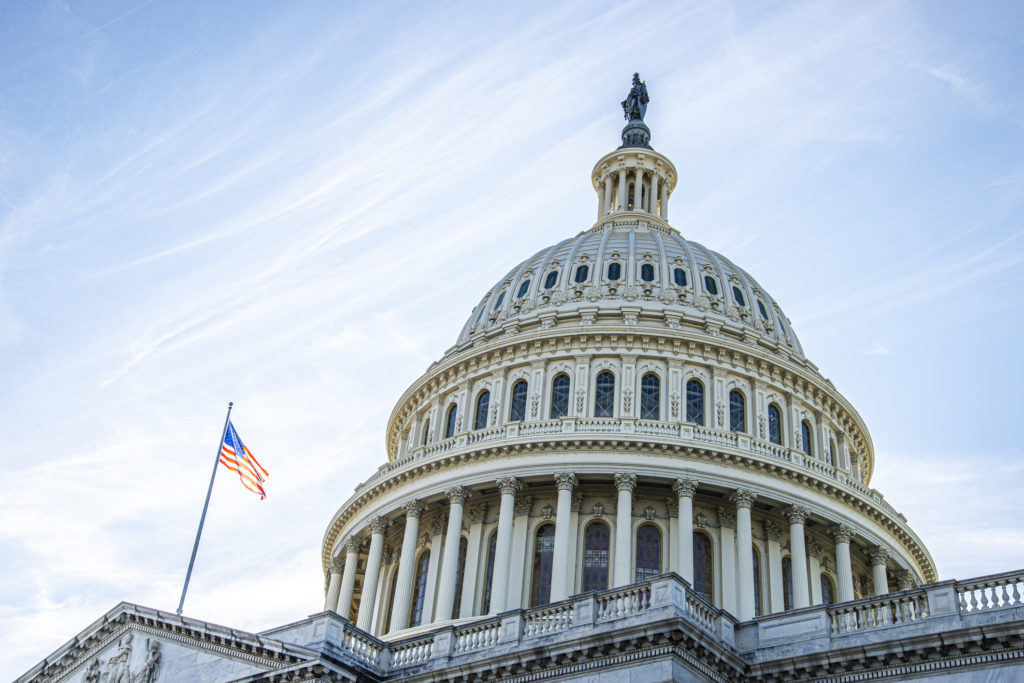
WASHINGTON (BP) – Protestant Christians remain easily the largest religious group in Congress, but those who identify as “unspecified” have expanded their advantage over Baptists in that category.
Protestants total 294 members, or 55 percent, of the 117th Congress, according to a study published Jan. 4 by the nonpartisan Pew Research Center. The analysis of data on members of the Senate and House of Representatives showed an increase of one Protestant from the previous Congress.
The report also continued to show the religious makeup of Congress differs considerably from that of the United States. While 88 percent of senators and representatives identify as Christian, only 65 percent of Americans do so. The Pew study groups Protestants, Catholics, Orthodox Christians and Mormons under the general category of Christian. And though only one member of Congress – Sen. Kyrsten Sinema, D-Ariz. – counts herself as religiously unaffiliated, 26 percent of Americans identify themselves in that way.
The largest Protestant category remains “unspecified/other,” which consists of 96 members who identify themselves by such descriptions as Christian, evangelical Christian or Protestant without citing a denomination. That is an increase of 16 from the previous session that followed the 2018 election. This sub-category does not include 12 members who labeled themselves as “nondenominational.”
The general category of Baptists is still the next to the largest among Protestants with 66 members, though that is a decline of six from the last Congress. At least 20 members of Congress are Southern Baptists.
Catholics make up the second largest religious group in Congress next to Protestants at 158 members or 30 percent. After Protestants and Catholics, Jewish members constitute the third largest group at 33 (6 percent). In addition, Congress includes three Muslims, three Unitarian Universalists, two Buddhists, two Hindus and 18 identifying as “don’t know/refused.”
Protestant and Catholic makeup of Congress has remained steady during the last seven sessions dating to 2009, according to Pew. In that span, Protestant numbers have been between a low of 293 in 2019-20 and a high of 307, while Catholics have totaled from 156 to 168.
The Pew study reported Baptists and two other Protestant subgroups are “underrepresented” in Congress compared to the American public. Baptists make up 12 percent of Congress but 15 percent of the United States. Only 0.4 percent of Congress identifies as Pentecostal, while 5 percent of Americans do. Nondenominational Protestants account for 2 percent of congressional members and 2 percent of Americans.
Pew’s analysis – based on data collected by the news publication CQ Roll Call – also found Protestant freshmen in Congress are less likely than incumbents to be Baptists at 8 percent vs. 13 percent.
At least six senators and 14 representatives who are members of Southern Baptist churches held their seats in the latest Congress.
Below are the incumbent senators and representatives whom BP has identified as members of Southern Baptist churches based on information provided through the churches or the congressional offices. BP did not receive by deadline for this story confirmation of church membership from the congregations or offices of four incumbents who have been Southern Baptist church members in the past. This list is based on church membership, not attendance.
Senate
Arkansas – Sen. John Boozman, R, second term.
Mississippi – Sen. Roger Wicker, R, third term.
Missouri – Sen. Roy Blunt, R, second term.
Oklahoma – Sen. James Lankford, R, first full term.
South Carolina – Sen. Lindsey Graham, R, fourth term.
Texas – Sen. Ted Cruz, R, second term.
House of Representatives
Arkansas: Rep. Rick Crawford, R, 1st District, sixth term. Rep. Steve Womack, R, 3rd District, sixth term.
Florida: Rep. Matt Gaetz, R, 1st District, third term. Rep. Daniel Webster, R, 11th District, sixth term. Rep. Vern Buchanan, R, 16th District, ninth term.
Georgia: Rep. Austin Scott, R, 8th District, sixth term. Rep. Jody Hice, R, 10th District, fourth term.
Kentucky: Rep. Harold Rogers, R, 5th District, 21st term.
Louisiana: Rep. Mike Johnson, R, 4th District, third term.
Missouri: Rep. Sam Graves, R, 6th District, 11th term.
Oklahoma: Rep. Frank Lucas, R, 3rd District, 15th term.
South Carolina: Rep. Jeff Duncan, R, 3rd District, sixth term.
Texas: Rep. Louie Gohmert, R, 1st District, ninth term. Rep. Brian Babin, R, 36th District, fourth term.
Protestants dominated the makeup of Congress in the distant past before the legislature became more diverse. In the 1961-62 session, 398 senators and representatives identified as Protestant, according to a Pew report based on information from the Library of Congress. Another 100 were Catholics, which meant 498 of the 535 congressional members identified themselves with the Christian religion.
The religious makeup in the new Congress by party differs significantly. Ninety-nine percent of Republicans identify themselves as Christians by Pew’s definition. Democrats are more diverse, with 78 percent identifying as Christians and 11 percent as Jewish.
The Pew analysis was conducted before Georgia elected its two senators and before two House seats were filled.
If you know of newly elected senators or representatives who are members of Southern Baptist churches, please email [email protected].
The Pew report is available online at https://www.pewforum.org/2021/01/04/faith-on-the-hill-2021/.

















